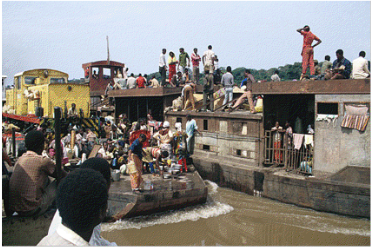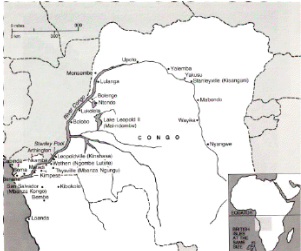15
Sep
September 15, 2010
in Congo
 Last week, NPR Morning Edition featured a 5-part series on the Congo River. The series starts at Kisangani (Stanleyville), the beginning of the navigable portion of the river, and continues to Kinshasa, the Capital of The Democratic Republic of Congo. According to Ofeibea Quist-Arcton, the main narrator for the story, the 3,000 mile long river is the main means of transportation for one of the poorest and most conflict-ridden countries in Africa. She describes it as a “central boulevard” that “serves as a floating supermarket, where local villagers paddle up to the barges to trade and barter goods.
Last week, NPR Morning Edition featured a 5-part series on the Congo River. The series starts at Kisangani (Stanleyville), the beginning of the navigable portion of the river, and continues to Kinshasa, the Capital of The Democratic Republic of Congo. According to Ofeibea Quist-Arcton, the main narrator for the story, the 3,000 mile long river is the main means of transportation for one of the poorest and most conflict-ridden countries in Africa. She describes it as a “central boulevard” that “serves as a floating supermarket, where local villagers paddle up to the barges to trade and barter goods.The barges, formed by two 50 ft flat rafts lashed together and pushed by a tugboat, serve as transportation and home for the many travelers on the barge. Villagers come out the barges in dugout canoes to trade cassava, plantain and pawpaws. The travelers use the bartered goods to prepare the food that sustains them for the journey. The barge dwellers also trade items to the villagers, providing goods that don’t come to the inland any other way, like used clothing and shoes, sugar, electronic products, etc. Security along the river reflects the nature of the unrest in the country and complicates the life of barge dwellers. The trip from Kisangani to Kinshasa can take anywhere from 10 days to more than a month. 

The NPR piece also reflects on the spiritual roots of the Congo River in the life of the people. According to sculptor Alfred Liyolo Limbe Mpuanga, a leading artist who grew up near the river, says “The Congo River is at one our mother and our father who nurture us. Because without water, there is no progress, no development, and we cannot live.” Ofeibea Quist-Arcton’s piece for NPR Morning Edition beautifully and holistically captures the cultural significance of this mighty river and paints vivid pictures of Congo.
For more, follow this link: http://tiny.cc/congorivernpr
